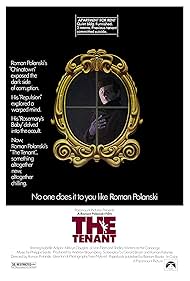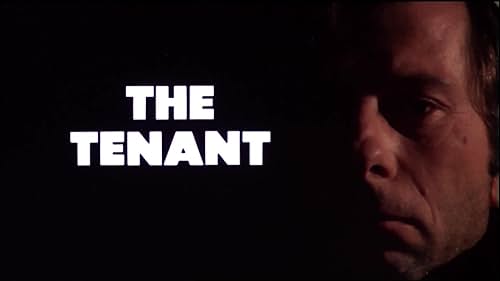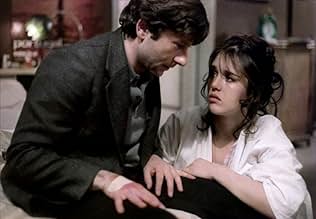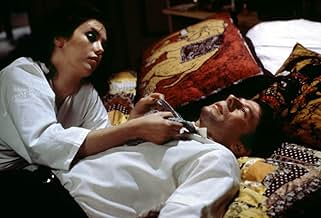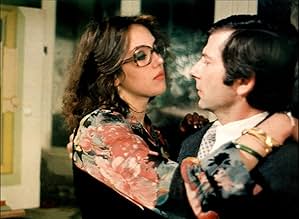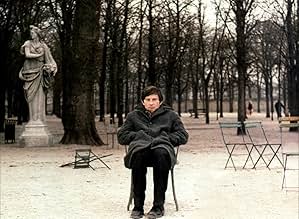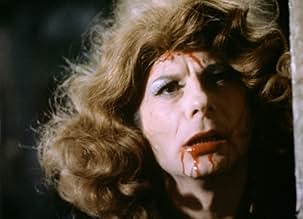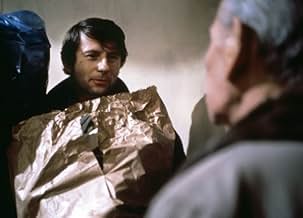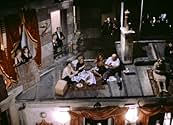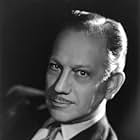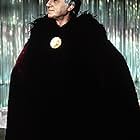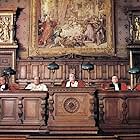A bureaucrat rents a Paris apartment where he finds himself drawn into a rabbit hole of dangerous paranoia.A bureaucrat rents a Paris apartment where he finds himself drawn into a rabbit hole of dangerous paranoia.A bureaucrat rents a Paris apartment where he finds himself drawn into a rabbit hole of dangerous paranoia.
- Awards
- 2 nominations
Claude Piéplu
- Neighbor
- (as Claude Pieplu)
Louba Guertchikoff
- Wife at accident
- (as Louba Chazel)
- Director
- Writers
- All cast & crew
- Production, box office & more at IMDbPro
Storyline
Did you know
- TriviaAlong with Repulsion (1965) and Rosemary's Baby (1968) this film is part of a loose trilogy by Roman Polanski dealing with the horrors faced by apartment and city dwellers.
- GoofsWhen Trelkovsky is unpacking as he moves into the apartment, a crew member is reflected in the small mirror adjacent to the kitchen sink. Two crew members are then reflected in the armoire's mirror as Trelkovsky opens it.
- Quotes
Trelkovsky: [while looking at himself in the mirror] Beautiful. Adorable. Goddess. Divine. Divine! I think I'm pregnant.
- Crazy creditsThe film has no end credits; only the Paramount logo.
- Alternate versionsAlthough the UK cinema version was complete the 1986 CIC video was cut by 6 secs by the BBFC to remove a brief extract of the banned nunchaku scene from Enter the Dragon (1973) (seen by Trelkovsky and Stella during a cinema visit). The cuts were fully waived in the 2004 Paramount DVD.
- ConnectionsFeatured in Revanche (1983)
- SoundtracksCour D'Immeuble
Written and Performed by Philippe Sarde Et Orchestre
Featured review
This is a wonderfully tense and intensely claustrophobic film with a slowly escalating and relentless psychologically terror. Roman Polanski stays true to his style from Rosemary's Baby and Repulsion. But this movie is more than a simple examination of the onset of insanity from within the person who is experiencing it. The theme of loneliness and the sense of purposeless petty existence are the real backdrop of this excellent work, the fact which makes it similar to Kubrick's Shining. Still, The Tenant has deeper literary roots. In my opinion, the inspiration for this movie came right from the great works of European literature -- the influence of Edgar A. Poe, E.T.A. Hoffmann and Nikolai Gogol is simply obvious. Poe's tales of madness out of loneliness, Hoffmann's stories of tragic delirium (most prominently, The Sandman, Majorat, and The Mines of Falun), and, of course, Gogol's eerie The Overcoat provided Polanski with the inspiration for this modern examination of the same topics.
Trelkovsky, a French citizen of Polish origin, is a nondescript and unassuming loner who moves into an apartment the previous occupant of which, a young woman, has thrown herself out of the window. The building is owned by the stern and ice-cold old man, who is hell bent on making sure his tenants do not make any noise and do not cause any trouble. He (and his underlings in the building) consider any sign of life to be "trouble." The old man spends much of his time enforcing a near-police-state-like order within the building. Undeniably, all kind of extremely weird things are going on in the building and I will not dwell on them. But it is the strange intrusiveness of the police-state which injects real terror into Trelkovsky's life. Faced with absurdity after absurdity, he makes some meek attempts to complain and ask for explanations: instead, noone is even ready to listen to him -- he is being treated like a piece of dirt practically by everyone.
It is also important that Trelkovsky's plunge into madness occurs suddenly and very abruptly. It seems almost like a psychological breakdown and a rebellion at the same time. He has lived the life of conformity, compliance, and quite resentment, never able to stand his ground or even establish his individual sovereignty. Trelkovksy's meekness is simply striking. His sudden and violent obsession with not letting "them" make him into the previous occupant of the flat is a pathological and concentrated reaction to the years of pent up passive aggression and anger. The infernal scream at the end of the film is the wild shout of anguish. In a certain sense, the completely unexpected finale of the film presents a huge puzzle which is not really intended to be resolved. But Polanski seems to be investing it with important symbolic meaning. This world is full of multiple Trelkovskys, little, unnoticeable people terrorized by their own sense of total insignificance. This is a vicious cycle of dependence between people's unconscious yet compulsive cruelty to each other and the tortured compliance with this cruelty by others.
This is an excellent, dark and captivating film in the best traditions of European psychological Gothic literature. I strongly recommend to watch this movie and take a look at Poe's, Hoffmann's and Gogol's stories.
Trelkovsky, a French citizen of Polish origin, is a nondescript and unassuming loner who moves into an apartment the previous occupant of which, a young woman, has thrown herself out of the window. The building is owned by the stern and ice-cold old man, who is hell bent on making sure his tenants do not make any noise and do not cause any trouble. He (and his underlings in the building) consider any sign of life to be "trouble." The old man spends much of his time enforcing a near-police-state-like order within the building. Undeniably, all kind of extremely weird things are going on in the building and I will not dwell on them. But it is the strange intrusiveness of the police-state which injects real terror into Trelkovsky's life. Faced with absurdity after absurdity, he makes some meek attempts to complain and ask for explanations: instead, noone is even ready to listen to him -- he is being treated like a piece of dirt practically by everyone.
It is also important that Trelkovsky's plunge into madness occurs suddenly and very abruptly. It seems almost like a psychological breakdown and a rebellion at the same time. He has lived the life of conformity, compliance, and quite resentment, never able to stand his ground or even establish his individual sovereignty. Trelkovksy's meekness is simply striking. His sudden and violent obsession with not letting "them" make him into the previous occupant of the flat is a pathological and concentrated reaction to the years of pent up passive aggression and anger. The infernal scream at the end of the film is the wild shout of anguish. In a certain sense, the completely unexpected finale of the film presents a huge puzzle which is not really intended to be resolved. But Polanski seems to be investing it with important symbolic meaning. This world is full of multiple Trelkovskys, little, unnoticeable people terrorized by their own sense of total insignificance. This is a vicious cycle of dependence between people's unconscious yet compulsive cruelty to each other and the tortured compliance with this cruelty by others.
This is an excellent, dark and captivating film in the best traditions of European psychological Gothic literature. I strongly recommend to watch this movie and take a look at Poe's, Hoffmann's and Gogol's stories.
- How long is The Tenant?Powered by Alexa
Details
- Release date
- Country of origin
- Languages
- Also known as
- Stanar
- Filming locations
- Rue la Bruyère, Paris 9, Paris, France(apartment building at N°39)
- Production company
- See more company credits at IMDbPro
Box office
- Gross US & Canada
- $1,924,733
- Gross worldwide
- $1,924,733
Contribute to this page
Suggest an edit or add missing content

